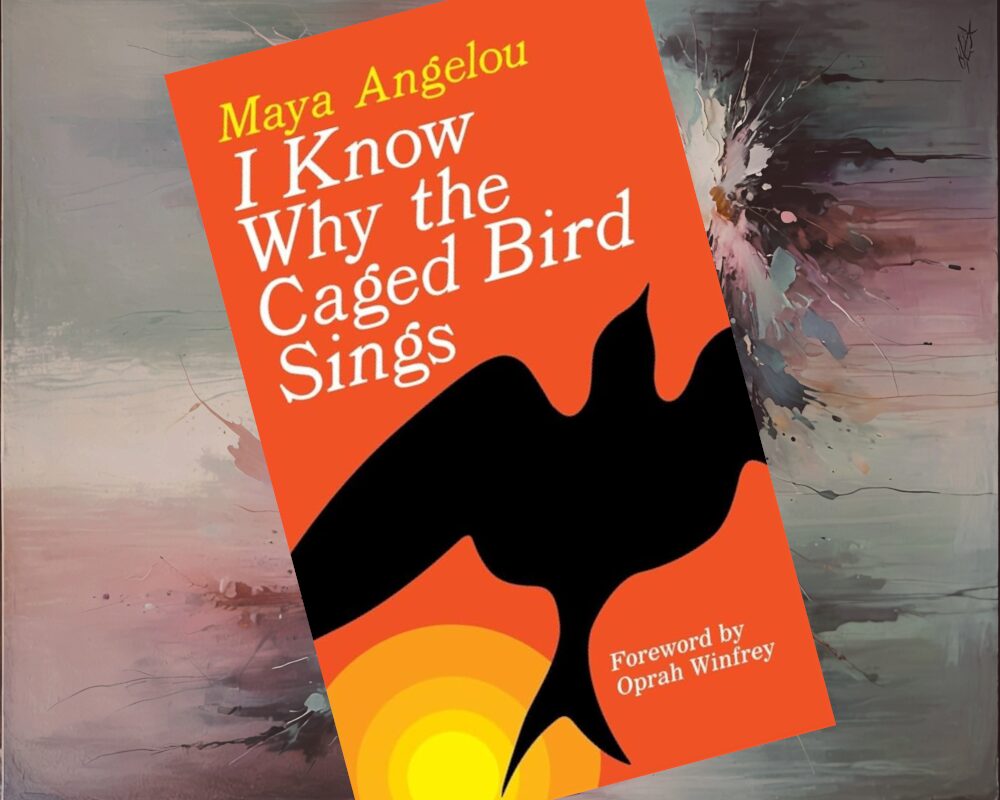I try to emphasize in this blog (as well as in the classes I teach) that literature is a conversation that’s been going on since the invention of history. Authors respond to authors, books to books, and #21 on the list of 1,000 Books to Read Before You Die is Maya Angelou’s autobiography, “I Know Why the Caged Bird Sings.” It drives home one of the practical reasons why viewing literature this way is apt: For years and years in America, people were excluded from that conversation.
I just finished teaching a unit with my Juniors in which we had a chance to read and discuss people like Frederick Douglass, as well as Langston Hughes, Arna Bontemps, and other authors from the Harlem Renaissance. “Hughes was one of the first black Americans who was able to make a living as an artist,” I tell my students. “That’s an astounding fact when you consider he’s the same age as my great-grandmother.”
Maya Angelou is one of the major African American voices to follow the likes of Hughes and Bontemps and has become essential reading for anyone who is interested in African American literature.

I read the book mostly while sitting at my desk in the teacher’s plan center, thinking about how I just don’t “get it.” Not that I dislike it or don’t understand, but that it wasn’t a book meant for me.
Race and issues of race were about as far from my experience growing up as they could have been. The town I’m from has about 1,500 people in it and is about as ethnically diverse as Sweden — very white, very middle-class; a town that existed as a place where highways met and where there was a John Deere dealership. I don’t consider that a good thing, necessarily (it was a safe place to grow up, certainly), but books like Caged Bird were one of my only windows into the experiences of black America.
Was it a good window or a window that provided an accurate depiction? Probably not. I can only try to understand what Angelou is talking about. I didn’t “get it.”
Crispity, Crunchity, Peanut Butter-y
One of my first memories of Angelou comes from Saturday Night Live, in a satirical sketch starring David Allen Grier. It’s a sketch I still randomly quote to this day:
The joke being, I suppose, that Maya Angelou would never stoop so low as to to advertise for anything, much less a candy bar. Such was her integrity that the very notion of her appearing in a commercial was comical. That was my impression of her — she was a serious woman who talked about serious issues and spoke the kind of poetry you were supposed to frown at and say, “Hmm, yes, I see,” in very sombre tones.
Which is, quite honestly, one of the things that has prevented me from ever really connecting with Angelou’s work — it’s the sort of thing that seems to preclude humor. The sort of thing that you daren’t laugh at or make light of.
Oh, there’re funny bits in “I Know Why the Caged Bird Sings” — or, at least, bits that are supposed to be funny — but it’s the sort of humor that you feel obliged to laugh at. Like when your drunk uncle tells the same joke for the 10th time that Christmas and you better laugh or you’re going to get it — that’s the sort of energy Angelou brings to telling a story about how she laughed so hard one time in church that she peed her pants.
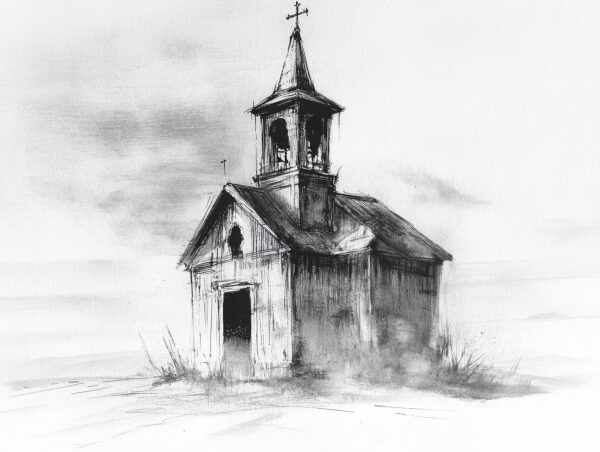
A Book Club Member’s Book of the Month Club Book
The particular edition of Caged Bird that I have features a foreword by Oprah Winfrey, who uses her introduction to express her disbelief at finally reading a book that spoke to her, a book that seemed to capture an experience both she and Angelou shared — namely, the experience of growing up as an awkward black girl.
I don’t know if I’ve ever felt the same way about a book. Sure, there have been books that I liked — I would even say there are a few books that I have absolutely loved — but I’ve never felt as if an author were reaching across some unfathomable gulf to tap directly into my brain, saying, “We’re alike, you and I.”
Mostly, I admire books by thinking, “Jesus Christ that author is talented.”
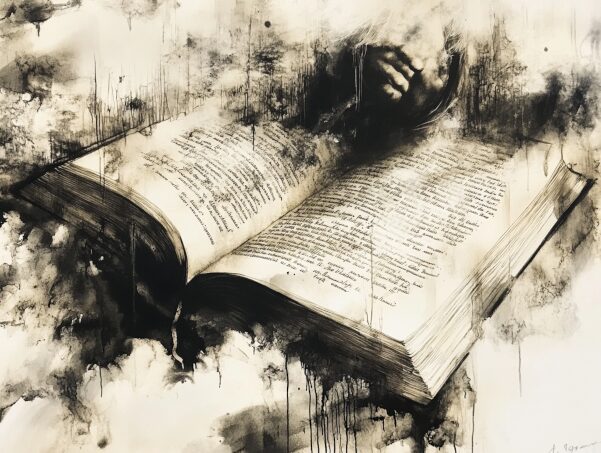
Even if it were possible that I could connect with an author like that, and it very well may be, I’m not sure I’d want to read that book. I barely like myself on the best of days and don’t particularly want to spend any more time in my own head than absolutely necessary. (Hello, darkness!) And if a person were able to capture what it was like where I was born and raised — really capture rural Nebraska — I probably wouldn’t care. It’d be like accurately capturing the essence of a random pigeon. Small towns are mostly boring and there’s a reason why Nebraska is called “fly-over country.”
(I have a theory that books and movies are only set in Nebraska if the authors/producers want a setting that is a metaphor for depression. I don’t have a problem with it. I think that’s fair.)
Still, I suppose I do take for granted that there are a plethora of books and movies that are about little white kids who go off on adventures. I never had to deal with the dissonance of wanting to play with a doll that didn’t share my skin color because I thought the other one was “normal.” That’s part of what Angelou is responding to — there’s an inherent question of why can’t we normalize books about the black experience?
Which is a fair question that a lot of people have asked and now it seems like we’re making progress in that direction. Or, at least, there are more published black authors today than at any point in America’s history. That doesn’t make up for anything, but it’s a step in the right direction.
Even if Maya Angelou is awfully dry.
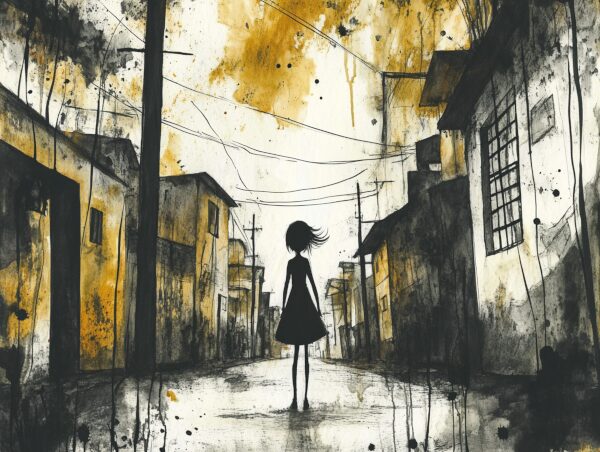
What’s That Tractor For, Though
I’ve known several people who were that way — the kind of people that you’d just better laugh at or there’s going to be trouble. One of them was Grandpa Don, who was the sort of person who, when he retired, moved from a regular house in Iowa to a full-on farm where he had a tractor and a barn even though he wasn’t a goddamned farmer. He was just a guy who listened to Rush Limbaugh and thought farming was just peachy.
At Grandpa Don’s funeral, one of my cousins stood up at the pulpit and told a story about how Don one time pulled him, my cousin, and my other cousin around on a trailer behind his tractor. The boys were eating apples for some reason — that’s what they did for fun, I guess, was drive around on a tractor trailer and eat apples all afternoon. Anywho, Don cut a massive fart, presumably loud enough to be heard over the sound of a tractor, and turned around to say, “How do you like them apples?”
Everyone in the church laughed when my cousin told that story, even though nobody thought it was funny. Even my cousin didn’t really think it was funny — he’d only gotten up to tell the story because his mom had made him. It was a funeral, goddamn it, and you were supposed to tell stories. And you’d better laugh at those stories because we’re a family and that’s what family’s do.
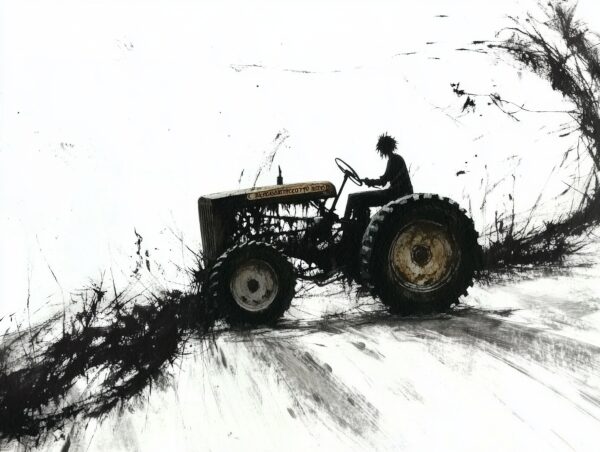
I didn’t cry when we buried Grandpa Don, even though I very explicitly tried to. I stood right next to the casket and looked at the hole in the ground and thought, “Alright, better start the waterworks.” I got sidetracked though when everyone said the Lord’s prayer and I thought, “When in the hell did everyone memorize this nonsense?”
Seriously, were we supposed to know that? Just, like, at the drop of a hat?
We’re Dying to Know
Maya Angelou died in 2014 when I was in South Korea teaching kids how to write essays very quickly.
I said to the children, “Maya Angelou died today. Do any of you know who that is? Er, was?”
They all unsurprisingly said that they didn’t. South Korea is just as homogenous as the town I grew up in — almost everyone who lives in Korea is Korean. And, while Koreans are mostly….ambivalent towards the Japanese, there isn’t a whole lot of racism going around, and thus there has never been a struggle to overcome it. They’ve got a whole different set of cultural issues; sexism, ageism, a tremendous teen suicide rate; they’re just as messed up as Americans are, but for entirely different reasons.
I thought about how best to explain who Maya Angelou had been, but struggled to do so without bringing up how goddamned racist America was. In the end, I just said, “She was a very talented author.”
Which is, quite honestly, what I think about her. Maya Angelou speaks to experiences that are beyond my reckoning. I recognize that she’s very good at writing and I can get lost in her prose just as much as the next guy, but she’s never been an author that spoke to me.
I’m sad about that. Should I be? I don’t know.
Maybe it’s just that I want to feel like I “get it” when I really don’t, when I’m just some kid standing by a hole in the ground wondering why he can’t cry, mouthing along with some alien litany. “Our father who art in heaven…”
